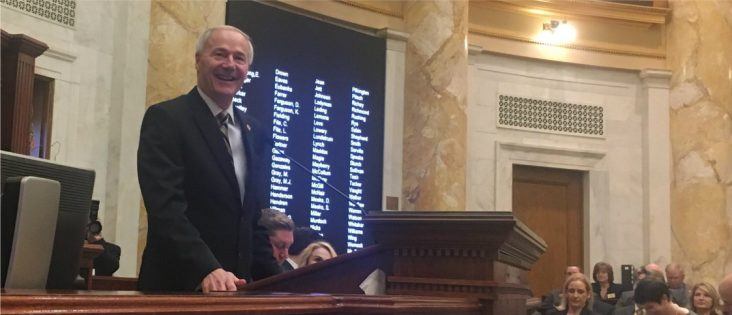Gov. Hutchinson outlines path to passage for Arkansas Works; offers direction on sovereign immunity
by February 11, 2018 9:51 am 1,477 views

Where will the votes come from for Arkansas Works in the upcoming fiscal session? Gov. Asa Hutchinson says it’s less about lawmakers changing their minds and more about reforming a program to satisfy conservative principles.
In a lengthy, wide-ranging interview on Sunday’s Talk Business & Politics, Hutchinson said he understands the three-vote deficit his Medicaid expansion program has in the Arkansas Senate, but he’s confident he can find a 75% threshold in both chambers for passage. Three state senators who supported the program have either resigned or passed away since the last close vote in early 2017.
“[W]here those votes come from, obviously that would mean that people that previously voted ‘no’ one or more times in the past would have to change their vote to ‘yes.’ But we’ve been working very diligently with them and they’ve asked a lot of very good questions. They’ve met consistently with our Medicaid folks at DHS and Cindy Gillespie and we’re trying to answer all the questions. And when all those questions are answered, I hope that they’ll be ‘yes’ votes,” Hutchinson said.
Arkansas Works will not be a standalone budget measure, but will be part of the Department of Human Services budget.
Hutchinson has asked the federal government for a waiver to Arkansas Works, a move designed to implement more work requirements for able-bodied low income workers and to cap enrollment for citizens making between 100% and 138% of the federal poverty level. While the Trump administration has sent guidance and approved similar waivers in other states, Arkansas has yet to get a green light, but is expected to.
The governor said he doesn’t view the debate in the upcoming fiscal session, which starts Monday, Feb. 12, as flipping votes.
“Let me emphasize it’s really not them changing a consistently held position, it’s a matter of them looking at this and saying, ‘The reforms that we’ve always advocated for are now in place,’ and so they would feel comfortable in supporting it based upon that,” he said.
“The Medicaid waiver’s a part of it, but it’s also what we were able to do last year in tightening up our review process to make sure people who are not eligible for it from an income standpoint are not receiving benefits. And we rolled 117,000 people off both traditional Medicaid and the expanded Medicaid just in 2017. And so, that kind of reform gives people confidence that we’re watching the dollars of it and that what is intended to be a help to people in healthcare trying to struggle up the economic ladder, that it’s going to benefit those that need it the most,” Hutchinson said.
A strategy to deal with Arkansas Works in a special session is unlikely says Hutchinson. He also isn’t sure anything else will rise to the level of calling a special session later this year.
“I don’t desire a special session,” he said. “There’s two criteria for having a special session. One is that there’s an urgent matter that needs to be addressed, that can’t wait until January. And then secondly, that there’s a consensus around as to how to address that and answer the problem,” he said.
Hutchinson contends that a recent controversy involving pharmacy reimbursement rates still has options for resolution, and he’s not convinced that an Arkansas Supreme Court ruling on sovereign immunity could even be addressed in a special session. He is actively providing guidance to state agencies on how he wants to see the sovereign immunity defense used — or not used — by the state in court cases.
“It should not be a blanket sovereign immunity across the board, in non-monetary cases particularly. We have a Claims Commission that’s set up that can handle monetary claims, but we need to have, obviously, relief for Freedom of Information lawsuits, for declaratory judgments, and I’ve asked my agencies: do not assert sovereign immunity without the approval of the governor’s office,” he said.
“That way, we can control it and make sure that citizens have access to the courts whenever it’s appropriate. And so, that’s our first remedy. Whenever you look at the solution long-term, one of the areas is tax cases, and the Supreme Court is considering this now. I directed my Department of Finance and Administration to advise the court that as a policy matter, in tax disputes, we want the citizens to have access to the courts. I believe that’s important. And so, that has been communicated. I hope the Supreme Court draws the right line on this and that we don’t have to have a constitutional amendment or other remedies to make sure that the public has the protections that they need,” Hutchinson added.
Watch more of Hutchinson’s interview, which includes comments on the pharmacy reimbursement rates, Congress, Donald Trump, his primary challenger Jan Morgan, and defense of his conservative credentials.
